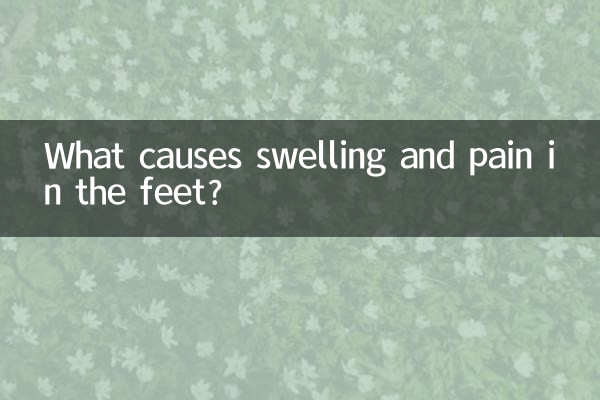What causes swelling and pain in the feet?
Soreness in the soles of the feet is a common symptom that can be caused by a variety of reasons. Among the hot topics on the Internet recently, discussions about health and lifestyle are particularly prominent, and many people are concerned about foot health issues. This article will combine the hot content of the past 10 days to analyze the common causes of foot swelling and pain, and provide structured data for readers' reference.
1. Common causes of foot swelling and pain

Foot swelling and pain may be related to the following factors:
| Reason | Description |
|---|---|
| standing or walking for long periods of time | Maintaining a standing or walking posture for a long time will cause muscle fatigue and poor blood circulation in the feet, causing swelling and pain. |
| Shoes don't fit | Wearing high heels or shoes that are too tight can increase pressure on your feet, causing swelling and pain in your feet. |
| plantar fasciitis | Plantar fascia inflammation is a common foot problem that manifests as swelling and pain in the soles of the feet, especially when getting up in the morning. |
| Edema | Water retention or circulation problems in the body may cause edema in the feet, causing swelling and pain. |
| Gout | Uric acid crystals deposit in the joints, which may cause swelling and pain in the feet, especially in the big toe joint. |
2. The relationship between recent hot topics and foot swelling and pain
Among the hot topics in the past 10 days, the following content is closely related to foot swelling and pain:
| hot topics | relevance |
|---|---|
| Sedentary issues in working from home | Sitting for long periods of time may cause poor blood circulation and cause swelling and pain in the feet. |
| High temperature and edema in summer | In hot weather, the human body is prone to edema and the swelling and pain in the feet increase. |
| Sports injury prevention | Excessive exercise or improper posture may cause muscle strain in the feet, causing swelling and pain. |
| Healthy diet and gout | A high-purine diet may induce gout, causing swelling and pain in the feet. |
3. How to relieve foot swelling and pain
For foot swelling and pain, the following measures can be taken:
| method | Specific operations |
|---|---|
| Rest and elevate your feet | Avoid standing or walking for long periods of time, and elevate your feet when taking breaks to promote blood circulation. |
| wear suitable shoes | Choose loose, comfortable shoes and avoid high heels or shoes that are too tight. |
| Cold or hot compress | Depending on the cause of swelling and pain, choose cold compress (reduce swelling) or hot compress (relieve muscle fatigue). |
| Massage and stretching | Relieve muscle tension by gently massaging your feet or doing plantar stretches. |
| Medical examination | If the swelling and pain persists or is accompanied by other symptoms, you should seek medical treatment in time to rule out serious diseases. |
4. Suggestions for preventing foot swelling and pain
Prevention is better than cure. The following suggestions can help reduce the occurrence of foot swelling and pain:
| Suggestions | Description |
|---|---|
| maintain moderate exercise | Strengthen your foot muscles with regular low-impact exercise, such as walking or swimming. |
| control weight | Excessive weight will increase the burden on the feet. Proper weight control can help reduce pressure on the feet. |
| diet regulation | Reduce the intake of high-salt and high-purine foods to prevent edema and gout. |
| Check your foot health regularly | Diabetics, especially, should have their feet checked regularly to avoid complications. |
5. Summary
Pain in the soles of the feet is a common symptom that cannot be ignored and may be caused by a variety of reasons. Combined with recent hot topics, we can see that lifestyle, environmental factors, and dietary habits are closely related to foot health. By understanding the causes, relief methods, and preventive measures for foot swelling and pain, we can better protect foot health and improve our quality of life. If symptoms persist or worsen, it is recommended to seek medical advice promptly and seek professional help.

check the details

check the details